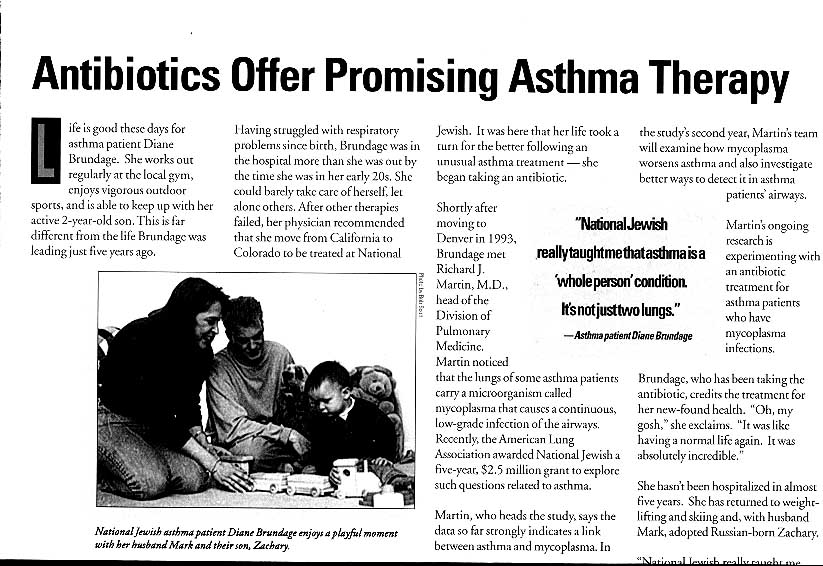ENTRANCE | HOME | 1 | 2 | 3 | 4 | LINKS | FUN STUFF | BULLETIN BOARD | BOOK STORE | DISEASES | SEARCH
ASTHMA AND MYCOPLASMAS
Numbers to call their mycobacteria research
http://www.njc.org/Markethtml/Mycobact_serv.html
Their ongoing research study on asthma and mycoplasmas
http://www.njc.org/Markethtml/MYCO.HTM
Article stating 16 out of 17 astmatics had mycoplasmas
http://www.njc.org/SAR95/Martin95.html
Another article about the asthma-mycos
http://www.njc.org/SAR95/Martin95_lay.html

|
True or False: True. According to a report in the September 1998 issue of the American Journal of Respiratory and Critical Care Medicine, M pneumoniae was detected by PCR in the airways of more than 55% of patients with chronic, stable asthma. There has been no previous systematic evaluation of Mycoplasma presence in the lower airways of individuals with chronic asthma. Mycoplasma pneumoniae, a common cause of both upper and lower respiratory infection in humans, has been shown to exacerbate asthma. While epidemiologic evidence exists linking Mycoplasma infection with asthma exacerbation, these studies have demonstrated such an association by isolation of the organism in throat swabs and by serologic documentation -- not by lower airway analysis. If this pathogen is a causal factor in chronic asthma, then it should be present in the lungs of individuals with stable, chronic disease. The present study by Kraft and colleagues documents M pneumoniae in the upper and lower airways of asthmatic subjects, warranting further study to determine if its presence is an epiphenomenon due to enhanced airway inflammation or a pathogenic mechanism in asthma. Source: Kraft M, Cassell GH, Henson JE, et al: Detection of Mycoplasma pneumoniae in the Airways of Adults with Chronic Asthma. Am J Respir Crit Care Med, 158(3): 998-1001, September 1998. (Abstract) Full-text (Temporarily available for a free trial period). |
ASTHMA AND VIRUSES
|
NEW YORK, Dec 24 (Reuters Health) -- Viral infections, not allergies, sparked asthma attacks in about half the adults examined in an urban county hospital in Texas, according to a study published in the December 7/21 issue of the Archives of Internal Medicine. ``Everybody thinks allergens are responsible for triggering asthma. But viruses are grossly underestimated as a trigger,'' said study author Dr. Stephen Greenberg of the Baylor College of Medicine, Houston, Texas, in an interview with Reuters Health. Researchers arrived at their conclusions after conducting two studies. One long-term study included 29 asthmatic adults who were treated at the pulmonary clinic of an urban county hospital. The other study examined 122 adults who came into the same hospital's emergency department with acute symptoms of asthma. The first group was followed over two fall and winter seasons, and each patient underwent testing for viral infection whenever he or she suffered an asthma attack. In these patients, 44% of asthma attacks were attributed to a respiratory tract viral infection. In the patients who were seen in the emergency department, 55% of their asthma attacks were associated with respiratory tract viral infections. The authors suggest that with asthma rates rising, particularly among people living in inner cities, ``strategies for the prevention of respiratory tract viral infections should be targeted toward the population with asthma.'' They also suggest that there is ``room for improvement in currently licensed influenza virus vaccines.'' SOURCE: Archives of Internal Medicine 1998;158:2453-2459. |
ENTRANCE | HOME | 1 | 2 | 3 | 4 | LINKS | FUN STUFF | BULLETIN BOARD | BOOK STORE | DISEASES | SEARCH